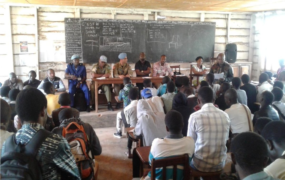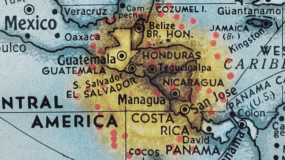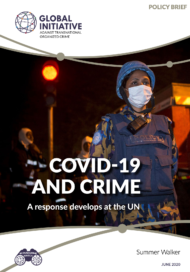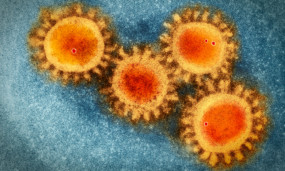Posted on 15 Apr 2020
Last week’s #CovidCrimeWatch centred on the nexus between the COVID-19 pandemic and the environment, with a focus on changes in environmental criminal markets. Among the many commodities around the world to experience a significant drop in demand, rosewood and gold are particularly pertinent given their important role in complex illicit economies.
This week, we once again explore how the virus is forcing criminal groups to adapt to changes thrust upon them. In some instances the evidence is unclear or inconsistent, while other examples show criminal groups behaving in what appears to be contradictory ways. Yet we can assume that in all cases they have the same end goal in mind: namely to mitigate the emergency in a way that best satisfies their interests.
Fragile states have also featured prominently in the headlines this week, with the UN Secretary-General highlighting that conflict zones like Syria, Yemen and Libya are likely to be hit the hardest by the virus. In these war-torn countries, health systems have collapsed and the state is often devoid of legitimacy or reach. Cases of COVID-19 have emerged in countries like Afghanistan and the Democratic Republic of Congo, which have long struggled with a proliferation of armed groups resourced by the illicit economy.
There has also been a call for a global ceasefire. While warring parties might adhere, it remains unclear whether non-state armed and criminal groups will respond in the same way. We look at recent dynamics in some of these conflict scenarios and feature a blog by the UN Police on the role of police in peacekeeping, both during and after the crisis.
Can we fight terrorism and a pandemic at the same time?
International Crisis Group, 31 March 2020
In their recent newsletter, the Islamic State of Iraq and Syria (ISIS) issued a call to arms for members to seize the opportunity of the outbreak to increase efforts towards global jihad: in particular to target pandemic-weakened states where affiliated insurgents are already active. Leading troop-contributing countries in some battle zones have been pulling back personnel to avoid contagion, including the US in Iraq and the French in the Sahel. This will leave the West critically vulnerable in the global fight against terror.
As our recent report on ISIS trafficking of antiquities in Iraq has highlighted, the ideological wars of extremist groups are often underpinned by the criminal economy. Their financing ranges from local protection networks and extortion economies to the systematic looting of cultural heritage sites. As they seek both to reclaim old territory and strike forth in potentially new zones of vulnerability, these groups are likely to deploy criminal modus operandi and seek alliances with local crime groups who may look to profit from the chaos.
The question to ask, which the Secretary-General’s call already partially answers, is whether there will be enough global attention and consensus to fight a war on two fronts.
Opportunism in Mozambique’s fragility drives conflict
New York Times, 23March 2020
In recent weeks, the fragile region of northern Mozambique has become an active combat zone as Al-Shabaab-affiliated insurgents known as Al-Sunna attacked gas facilities, mine sites and communities, and occupied local arm bases.
While the $60 billion oil installations are probably the big prize, Mozambique’s northern beaches have also become a hub for the heroin trade, with coastal towns south of Mocímboa da Praia known as key landing sites for heroin shipments. These are consolidated and containerized at the deep-water port of Nacala. Mocímboa is also a key import point for arms and export point for ivory and other illegal wildlife products derived from poaching across the region.
Illegal activities can be conducted with ease on this stretch of the East African coast. Al-Sunna has capitalized on this and is using camps and routes that have long been used by organized-crime syndicates in Cabo Delgado to evade authorities.
Migrants at a crossroads
Al Jazeera, 9 April 2020
In Niger, a country that plays a key role in migrant flows – both legitimate and otherwise – the coronavirus pandemic is having a hugely detrimental impact. The majority of the migrants come from West Africa, hoping to reach Algeria, Libya or European countries across the Mediterranean. In the thick of the COVID-19 outbreak, migrants who have travelled into Niger are now trapped there, as countries in the region are closing their borders to contain the spread of the virus. Men, women and children have been forced to quarantine in tented facilities, either at the military border post of Assamaka or in the city of Arlit.
Border closures in most West African nations have almost halted migrant flows in the short term. This is likely to change in the medium term as smugglers adapt to meet the demand for migration, which is likely to grow. Poverty levels are likely to be exacerbated as a result of restrictions that have already disrupted informal cross-border economies, upon which many West Africans depend. In Niger, for example, these had already been impacted in mid-2016 when the country introduced EU-backed anti-smuggling measures to reduce migratory flows to Libya and Europe. The economy in northern Niger was deeply affected as a result. As human-smuggling activity slowed, the country witnessed a rise in human trafficking and exploitation, with some smugglers looking to increase their profits from increasingly rare migrants – especially in southern Libya.
We highlighted these trends in our two reports, ‘The Human Conveyor Belt Broken’ and ‘After the Storm’. In addition to damaging local economies, restrictions on the movement of people in response to the coronavirus pandemic are also likely to push smugglers towards even more dangerous routes and practices. This further increases the vulnerability of migrants.
Drug supply chains running dry?
Sky News, 9 April 2020
Across the UK, gang rivalries seem to have been put on hold as members abide by the lockdown measures introduced to contain the coronavirus. A former senior gang member and founder of Gangsline Foundation Trust has said that stabbings, which are an all-too-common feature of gang activity in the UK, have ‘definitely stopped’ – as have all other forms of gang violence. He also claims that ‘county lines’ activity – a modus operandi that emerged around 2014 whereby young children are exploited to transport drugs across the country – has fallen. However, the head of a task force set up to tackle the issue has said that current lockdown measures have not resulted in a reduction of county lines activity. Detecting the drug runners has, however, become far easier for the police as a significant reduction in both national rail services and passenger traffic means that they are considerably more conspicuous.
Some of this may just be an issue of time, however, as different gangs may be sourcing from different suppliers, and upstream impacts on supply chains may limit how much they have to distribute. Some of our work with drug-user communities in East Africa has shown how distinctly the patterns of movement of different suppliers can be seen in the physical characteristics – such as the retail packaging – of the drug.
Zones of fragility are often a throughway for moving illicit commodities, and as drug traffickers try to regroup their operations, they may be more likely to divert through fragile states than along their usual routes. Guinea-Bissau is a good example. The country is currently reeling from a political crisis, but local GI-TOC networks report that corrupt elements within the police force have capitalized on the turmoil of the pandemic. Osvaldo Vieira International Airport has ostensibly been shut for health reasons, but planes that are suspected to include cocaine shipments have been seen landing here.
Violence falls as communities go into lockdown
Bloomberg, 9 April 2020
The coronavirus is now it is making its way through Latin America, with between 2 000 and 8 000 confirmed cases recorded in many countries across Central and South America – from Mexico and Peru to Ecuador and Chile. Brazil, the worst-hit country in the region, had recorded over 22 000 confirmed cases of the virus, and 1 230 deaths at the time of writing.
With people forced inside their homes, streets emptying and social gatherings all but disappearing, the virus appears to have had a drastic effect on violence across the region. In Rio de Janeiro, gun-related killings in the past month are a third of the number recorded for the same period last year. Furthermore, in El Salvador, which in 2019 had the third-highest homicide rate in Latin America, killings in March were the lowest they have ever been – with 65 homicides recorded. Guatemala also saw the lowest number of killings in March for at least a decade.
As we have stressed throughout this series, criminal actors have had to adapt to this new world. But the implications of the pandemic in the medium to long term are difficult to predict. We know little about the impact on cocaine supply, for example.
What we’ve seen on the street is that some gangs have allowed business owners to forgo extortion payments, while others are in a less charitable mood. Their benevolence may be directly linked to how business is faring in other sectors. Criminal organizations cannot last long without a key source of income. Without regular extortion payments from business owners, these groups may turn to other illicit channels to maintain their wealth and power. Only time will tell what the longer-term ramifications for criminal activity will look like. One of this week’s accompanying blogs explores the issue of extortion in Central America, including the ‘Uberization’ of both extortion payments and drug deals.
Altruism or cynical opportunism?
The Guardian, 10 April 2020
In Italy, one of the worst-hit countries by the coronavirus pandemic, the immense public-health crisis has been accompanied by severe economic upheaval. With thousands of establishments put out of business in the past month – including bars, restaurants and shops – business owners and workers alike have been deeply affected by the lockdown. To compound the suffering, the estimated 3.3 million workers engaged in the country’s vast informal economy – which has an estimated value of up to €211 billion – are effectively shut off from government financial support. Italy’s mafia groups have, in response, sought to consolidate their social support by distributing food for free in the community.
As explored elsewhere in this newsletter and in previous editions, criminal groups seek to consolidate their power in communities in various ways. This includes through the provision of services – thus portraying themselves as a legitimate alternative to the state. The cynical opportunism of criminal organizations in the aftermath of emergencies is by no means unprecedented. If governments want to prevent mafia groups from exploiting the crisis, they need to provide the financial support that businesses and workers need to survive, lest criminal actors beat them to the punch. In the coming weeks, GI-TOC will be publishing a series of interviews with leading figures in the fight against the mafia in Italy.
READ MORE:
L’economia criminale del post-emergenza Covid-19
El Cartel del Golfo reparte despensas en Tamaulipas por covid-19
Crime drops around the world as COVID-19 keeps people inside
#CovidCrimeWatch is curated by Lyes Tagziria.



